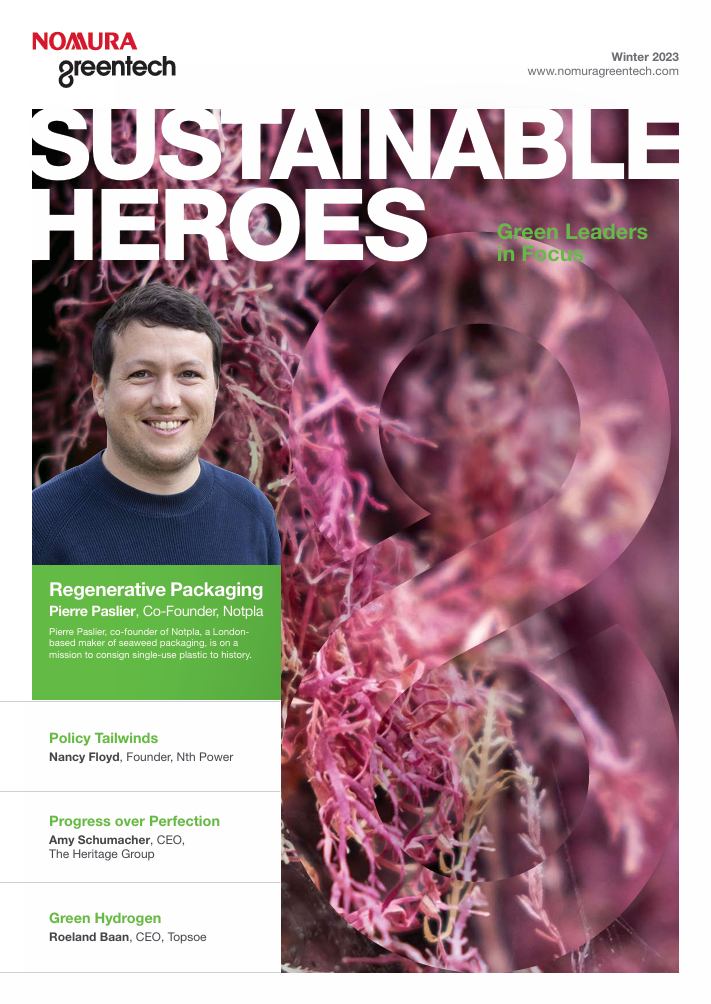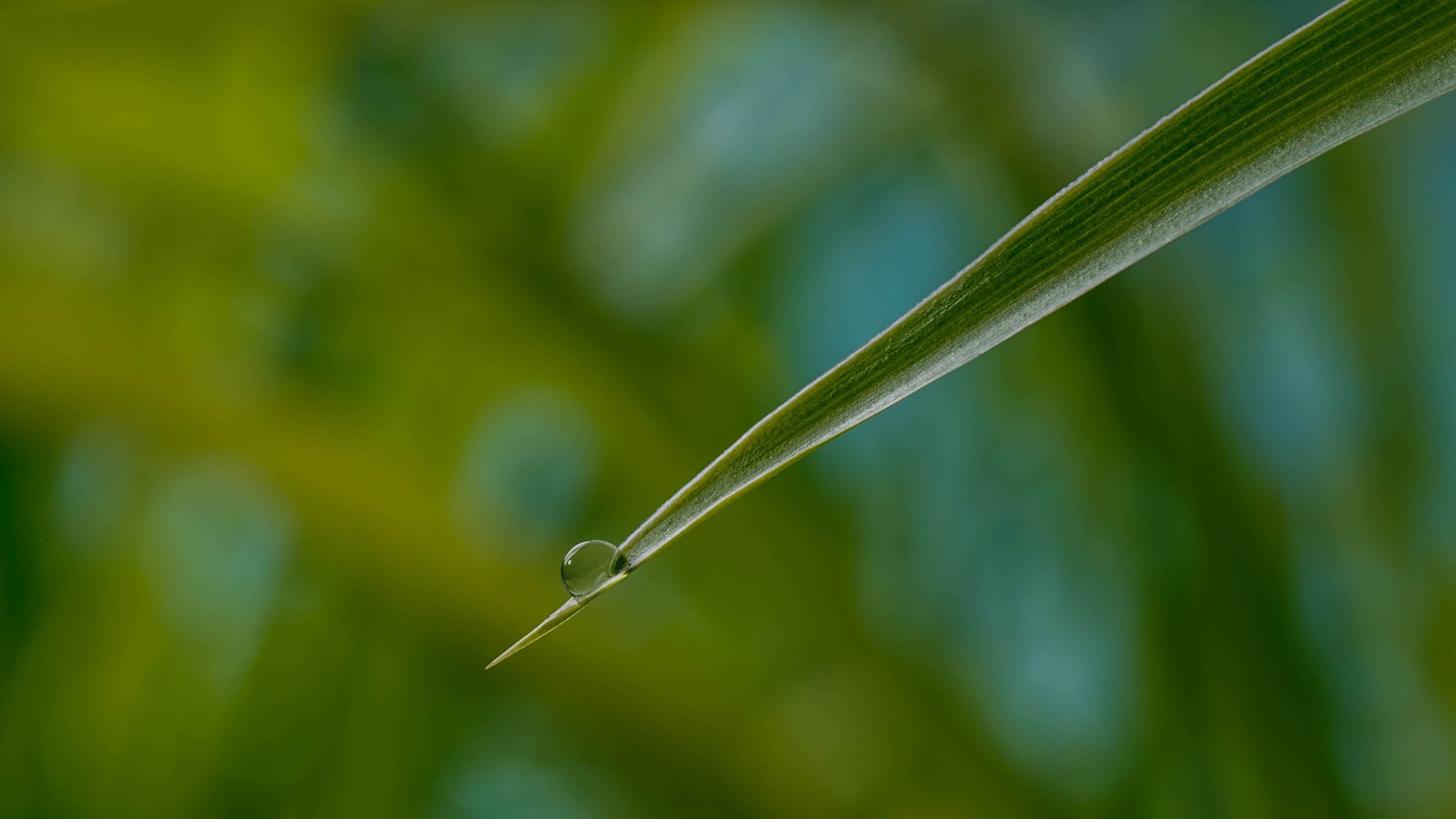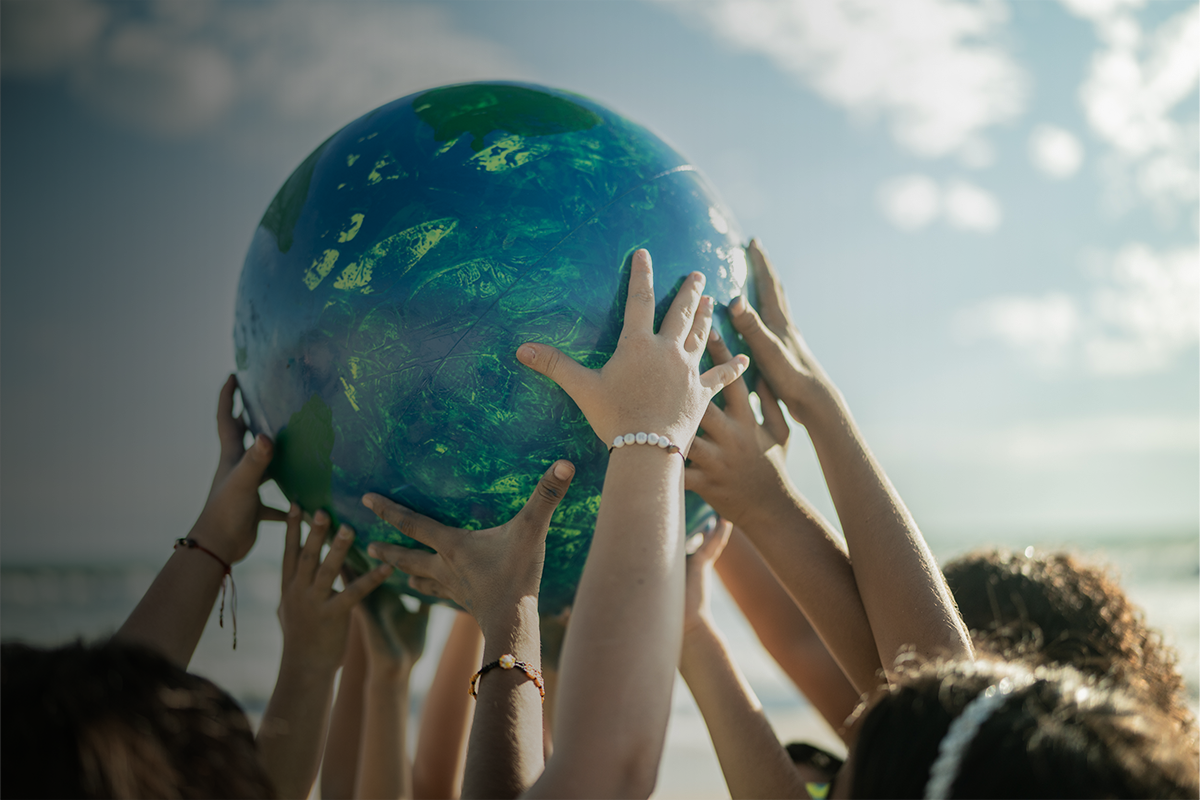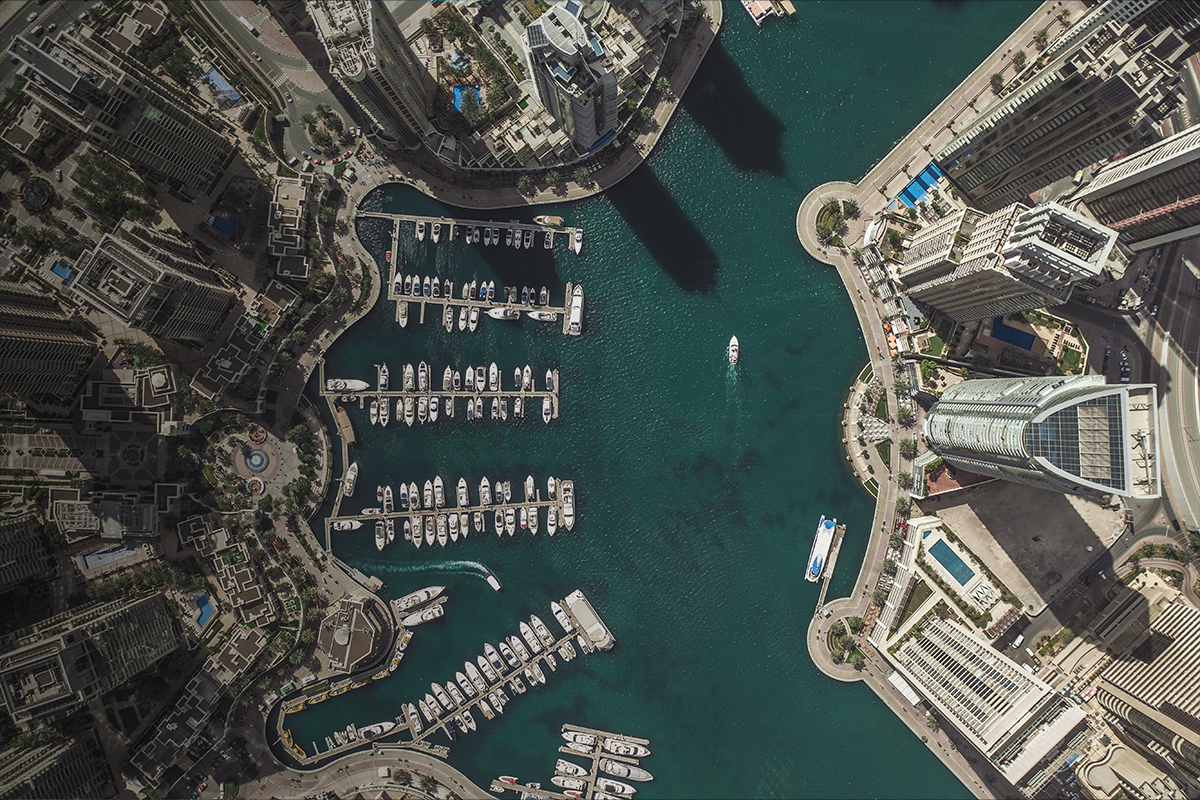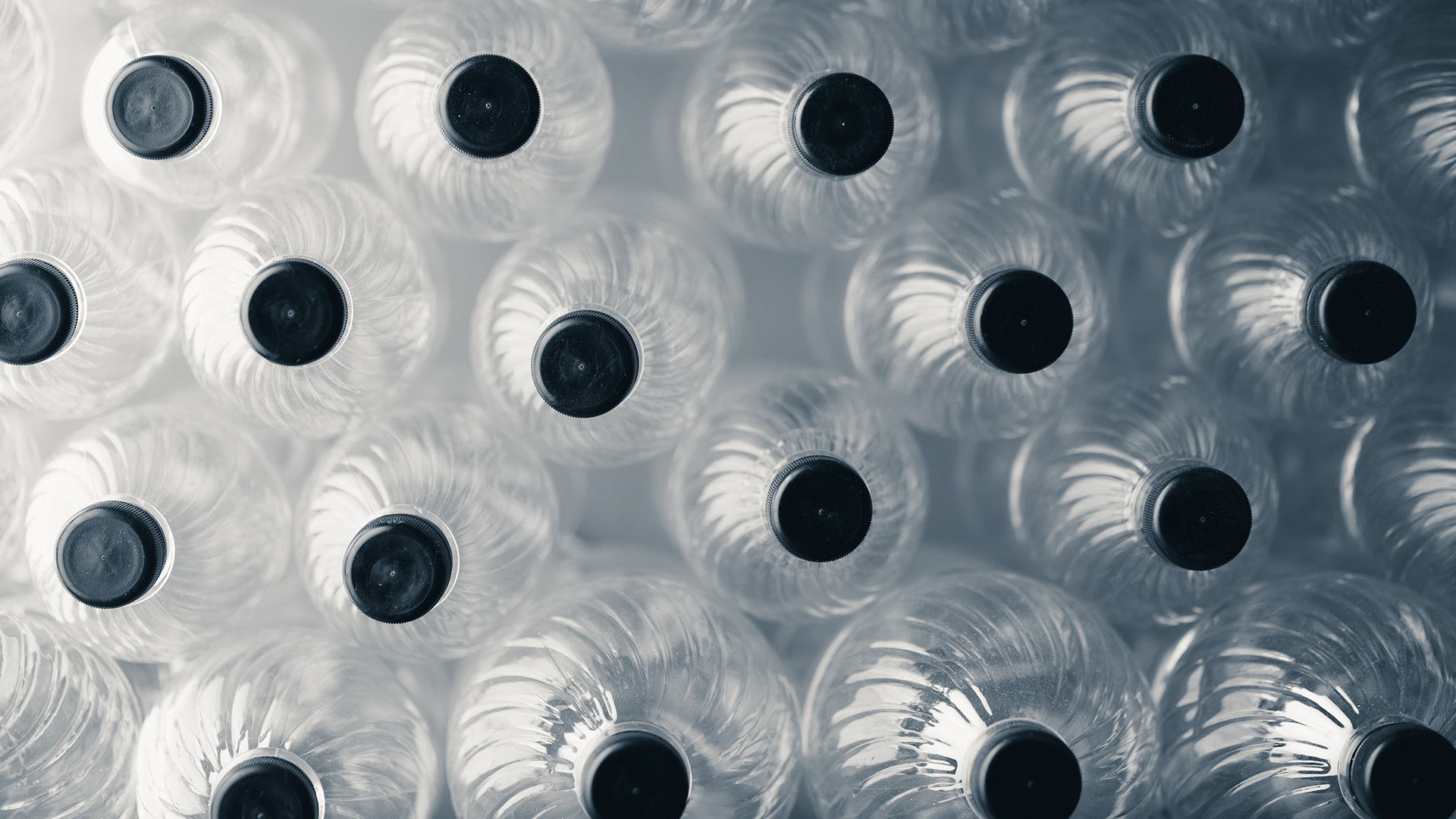-
Microplastics are in our blood, in the air we breathe and the water we drink. Plastic will keep on accumulating for as long as we keep using it
-
The UK’s new ban on some single-use plastics and The Netherlands’ tax and ban are big tailwinds to curtail their use in food packaging
-
Notpla has retrofitted existing factories that produce plastic coated takeaway boxes with seaweed versions, saving about 5 million food takeaway containers
What first triggered your interest in sustainability?
I owe it to my parents who brought to my attention our impact on the broader environment and the consumption of products with excessive packaging.
I think it was always at the back of my mind but there was another moment which flicked a switch. I started my career as a packaging engineer for L’Oréal, the cosmetics company and we were making hundreds of millions of plastic bottles and other packaging, seeing them being produced at incredible speed on conditioning lines.
I realized that I was putting my mind to the service of making more of those things that were bad for the planet and would stay around for hundreds of years.
And from that point what made you establish Notpla?
I recognised that this job at L’Oréal was not for me so I quit and enrolled in a Masters at Imperial College in London. That's where I met my co-founder Rodrigo who was an architect by background and had been working at the intersection of discarded plastic bottles to create installations that would feature those waste materials.
We both had an understanding that plastic was a problem and it focused our innovative lens on the topic. During the Masters course we became interested in how we could create man made fruits using natural extracts.
One of those extracts was from brown seaweed that is currently used to make fake caviar. When we discovered this technique, invented a hundred years ago, we were surprised to learn that you can make a gelatinous, transparent, tasteless membrane out of seaweed.
That was a ‘eureka’ moment as we realized we could use the seaweed extract for other applications, not just fake fish eggs and jellies. That was the starting point and to our surprise, those first few prototypes of little bubbles holding water, created in our kitchen, went viral when we showed them online.
At that point we didn't believe that people would pay so much attention to this natural biodegradable and edible packaging but as they did, it gave us extra motivation to explore it as a proper business.
How serious is the problem of plastic pollution that you're trying to solve?
Working on this topic can sometimes feel a little overwhelming and at the heart of the problem is the fact that we're using a man-made material that hasn't been on this planet for more than 150 years and we're using it for things that are performing their functionality for less than five minutes in such vast quantities that it is starting to choke the rest of our natural environment.
Often when we talk about plastic pollution, people imagine the turtle with a straw in its nose or a big piece of plastic floating around the ocean but what's problematic with plastic is that it's a forever waste.
It only fragments smaller and smaller over hundreds of years. It never fully disappears as nature doesn't know how to incorporate it back into the natural system. Much of this plastic is finding its way into micro plankton which is disrupting a huge amount of carbon sequestration from happening in our oceans.
It's also going up the food chain to marine animals and eventually into humans. We have it in our blood, it’s in the air we breathe and the water we drink. It will keep on accumulating for as long as we keep using it.
Did winning the Earthshot prize in 2022, backed by Prince William, change your impact and business trajectory?
It was massive. There is a £1 million prize which is always useful for R&D, buying expensive equipment and growing the team but what you can't buy is the willingness of businesses to work with you as a partner.
After winning the prize, we saw a significant shift in the willingness of companies to return our calls. It accelerates scalable production and distribution. For us it's been incredible to have that visibility and seal of approval.
It means that we are on the way to replacing tens of millions of single use plastic with the help of our new partners.
Prince William is a big fan of Aston Villa and he literally called them to look into Notpla for the stadium and from there we started to work closely with catering companies. That pilot has opened many more doors.
You've created an edible water pouch and now rigid materials. Which segment has the biggest sustainability impact?
We are starting with a handful of products but our goal is to create a suite of sustainable solutions. Our packaging can either be eaten, composted, dissolved, or recycled.
Firstly, we are targeting places where there's a quick consumption of liquids and have been successful in marathons and races where a huge amount of plastic is used for hydrating the runners.
We are taking this to the next level with Decathlon, the sports retailer by working on eliminating plastic from their energy gel range which is exciting as there’s a high chance of empty pouches being left on a trail in nature.
Our takeaway food containers target the food service industry. In Europe alone over 2 billion containers are used every year that are usually composed of cardboard with a thin layer of plastic inside to make it resistant to water and grease which we can replace with our seaweed.
We work with Just Eat, the online food delivery platform but we also have a number of other solutions in the pipeline such as flexible film for making sachets and pouches starting initially with detergent pods and other types of soluble applications.
Today some of our products are at different levels of industrialization but our edible bubbles and our takeaway food containers are the most scaled-up products.
We have managed to retrofit existing factories that produce plastic coated takeaway boxes with our seaweed which has saved about 5 million takeaway food containers. We are active in 9 countries in Europe where hundreds of restaurants are using our products instead of plastic.
We are working on containers for dry food and beyond this we are excited about a number of innovations including injection moulding for disposable cutlery, which were banned in the UK in October.
Equally, we have a seaweed paper which uses the by-product from the seaweed extraction process. It's a way to be even more circular and those are exciting opportunities to help brands switch away from plastic.
More hospitality companies and sporting venues are adopting alternatives to disposable plastic. How far are we from consigning single use plastic to history?
Within the next five years we're going to see a huge acceleration towards plastic solutions.
We see that with the UK’s new ban on single use plastics and The Netherlands has a tax and ban that is significantly curtailing the use of plastic in takeaway food containers.
In The Netherlands we are the first plastic- free solution to be certified by the government.
Through legislation and innovation, we will see a quickening in the demise of single use plastic.
That being said, plastic is such a high performance material and it is so heavily subsidized that certain use cases will continue for a while.
Are you seeing a push or pull from consumers and brands themselves?
We're seeing a massive shift in consumer sentiment. Purpose led brands are growing rapidly, they are able to swim where traditional brands are sinking as they are not delivering the values expected by consumers.
It’s great to see that doing good business with good values is turning into an advantage or even a requirement.
With B2B brands, it's more hit and miss because they are shielded from consumer pressure but eventually everything flows back to consumers. That’s especially true in our world where we see friction in getting listed by distributors but pressure keeps on coming from their customer who ask for sustainable solutions so eventually they have to list us.
Is regulation a tailwind in your industry?
The UN is corralling member states to sign a global plastics treaty to reduce plastic pollution. It’s a significant moment as we are talking about materials at the heart of our society.
In Europe the single use plastic directive is defining once and for all what is and isn’t plastic with two simple criteria: Native polymers abundant in nature that haven't been chemically modified are not plastic. Any other polymer is in the plastic category.
This differentiation creates a very clear aspiration for innovation within the realm of what nature already knows and exists.
We see more innovation happening within this native polymer space because it will be exempt from taxes and labelling that the product contains plastic.
We are keen to create an industry and encourage competition because that's how you convince big corporates to move without feeling like they are taking a risk to put all of their production with Notpla.
Disclaimer
This content has been prepared by Nomura solely for information purposes, and is not an offer to buy or sell or provide (as the case may be) or a solicitation of an offer to buy or sell or enter into any agreement with respect to any security, product, service (including but not limited to investment advisory services) or investment. The opinions expressed in the content do not constitute investment advice and independent advice should be sought where appropriate.The content contains general information only and does not take into account the individual objectives, financial situation or needs of a person. All information, opinions and estimates expressed in the content are current as of the date of publication, are subject to change without notice, and may become outdated over time. To the extent that any materials or investment services on or referred to in the content are construed to be regulated activities under the local laws of any jurisdiction and are made available to persons resident in such jurisdiction, they shall only be made available through appropriately licenced Nomura entities in that jurisdiction or otherwise through Nomura entities that are exempt from applicable licensing and regulatory requirements in that jurisdiction. For more information please go to https://www.nomuraholdings.com/policy/terms.html.

